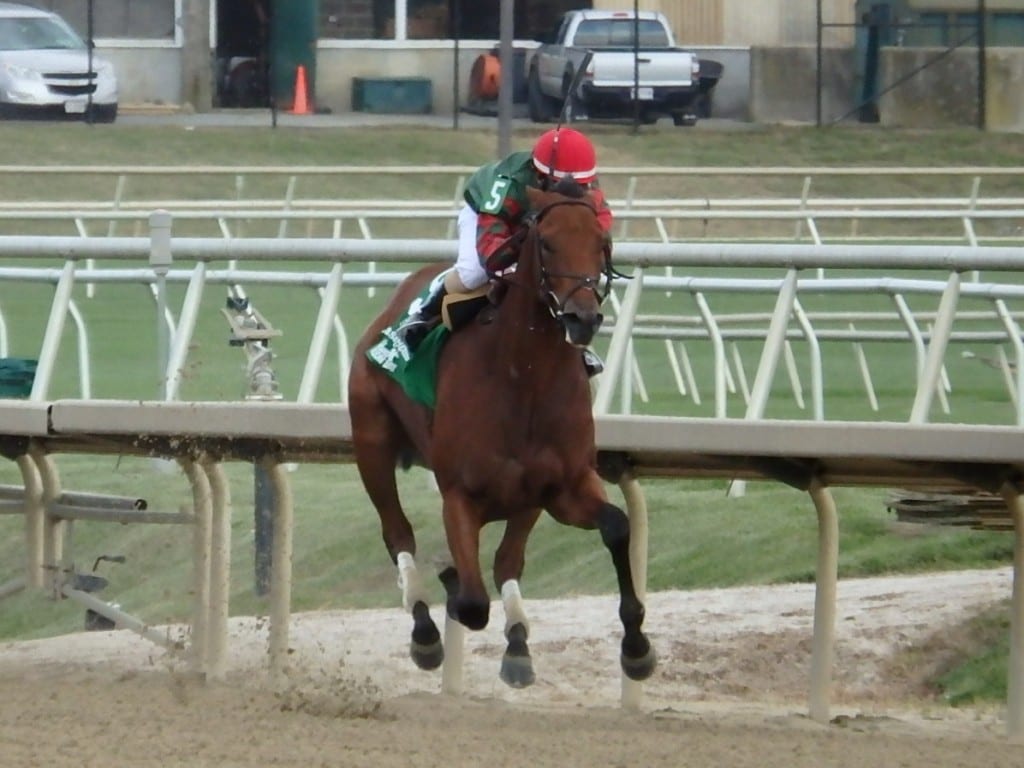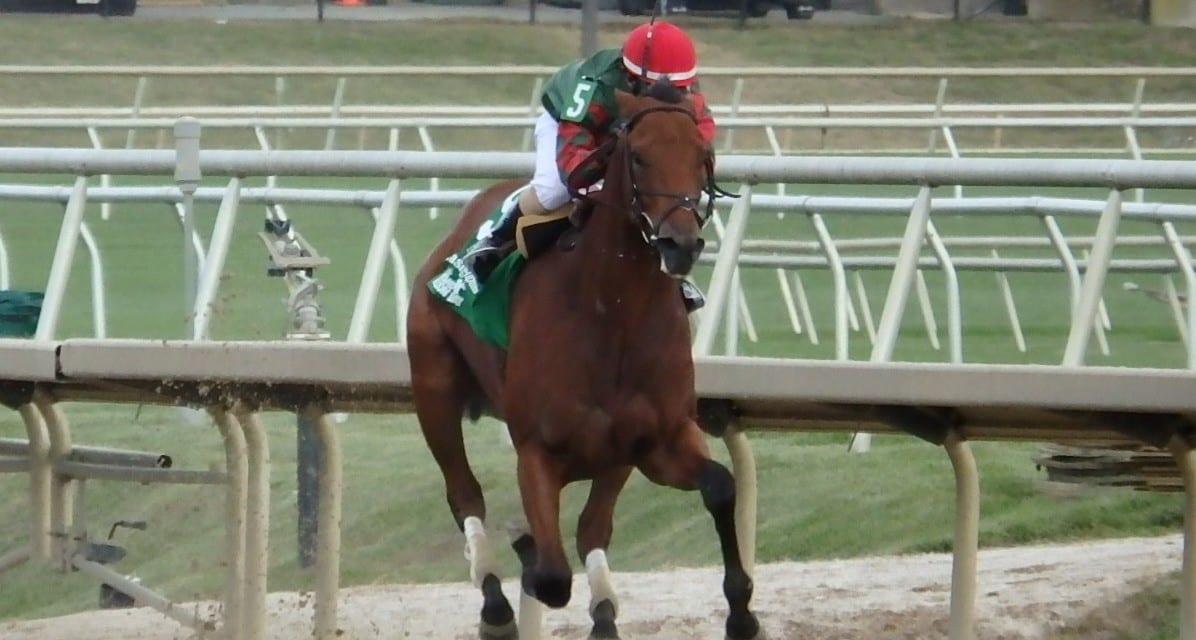
Corvus won the Maryland Million Nursery at first asking — at odds of 25-1. Photo by The Racing Biz.
by Frank Vespe
The Maryland Million Nursery won’t be decided on the racetrack after all.
The race, which was run on October 17, 2015, will instead be decided by the Maryland Racing Commission at its December 15 meeting. That’s because Country Life Farm’s Josh Pons has appealed a stewards’ decision to fine winning trainer Katy Voss but not disqualify her horse, Corvus, after that runner tested positive for the prohibited vasodilator isoxsuprine, Pons and Maryland Racing Commission executive director Mike Hopkins confirmed December 1.
Corvus, a 25-1 outsider making his racing debut, posted a dominant 1 3/4 length victory in the $100,000, six furlong test for Maryland-sired juveniles. Flash McCaul, a horse owned by Pons’s Country Life Farm, rallied to be second in the race.
But two weeks later, on October 31, chief steward Adam Campola called Voss to inform her that Corvus, a son of Dance with Ravens, had tested positive for isoxsuprine. That medication is chiefly used to treat foot problems in horses. Though primarily therapeutic in nature, isoxsuprine is not on the list of 26 medications permitted under the uniform national medication program, which Maryland has adopted.
The finding came as news to Voss, who believes that either the horse was unintentionally given the medication by one of her employees or the test was in error.
“Corvus was not on isoxsuprine, period,” she said. “He never was on it.”
Because isoxsuprine is not permitted in any amount, its presence was noted but not quanitified.
Voss said that the Campola told her that the typical penalty for an isoxsuprine positive was a fine to the trainer, but no disqualification or loss of purse to the owner. At her hearing November 8, Voss waived her right to have a split sample tested.
“I was going to get a split,” she said, “but when they assured me it’s not a disqualification, the advice I got was not to waste my money.”
The stewards issued their official ruling — a $500 fine, no disqualification or loss of purse, and two points assessed against her under the multiple medication violation points system — shortly thereafter.
And that’s where the situation gets sticky.
Under racing’s standard practices, isoxsuprine is a Class 4 drug, which carries a “Class C” penalty. Class 4 drugs include “therapeutic medications that would be expected to have less potential to affect performance” than more potent medications, according to the Association of Racing Commissioners International model rules. Some class 4 medications, such as some non-steroidal anti-inflammatory medications, are on the list of permitted “threshold” medications; others, such as isoxsuprine, are not.
Voss believes that isoxsuprine should be permitted, a position that some veterinarians share, because, as she put it, “it’s not performance-enhancing.” She said that she was told it was not included on the list because it is not commonly used any longer.
Regardless, the recommended penalty for a Class C violation, according to the model rules, is, for the trainer, “a minimum fine of $1,000 absent mitigating circumstances.”
And for the owner: “Loss of purse,” plus a requirement that the horse pass a Commission-approved examination prior to running again.
In addition, because the medication is not on the permitted list, the trainer receives two multiple medication violation points, rather than the one point she’d have received had the medication been among those allowed. When a trainer hits three multiple medication violation points, the uniform program calls for an automatic 30-day suspension in addition to whatever penalties the violation incurs. Thoroughbredrulings.com does not list Voss as having any prior medication violations in the last 10 years.
For both Pons and Voss, there is plenty at stake — beyond the purse money. Were Corvus to be disqualified, he would lose the $55,000 winner’s share of the purse, while Flash McCaul would see his earnings climb by $35,000.
In addition to owning Flash McCaul, Country Life Farm is the horse’s co-breeder, along with the Friesan Fire Syndicate and Mary and Clifton Cornwell. Country Life also stands Flash McCaul’s young sire, Friesan Fire. A win in this race would be the first stakes win for Friesan Fire’s progeny.
Voss, meanwhile, is co-owner of Corvus, along with Robert Manfuso and Wayne Harrison. And she and Manfuso bred Corvus.
Pons declined to comment beyond confirming he had appealed the stewards’ decision, saying he thought it “better to work through the Racing Commission process.” Hopkins, likewise, would not comment “on an open case.”
It is clear that there are many facets — purse money, breeders’ awards, black type, the effectiveness and fairness of the medication rules — to the Corvus question.
But to Voss, it may be simpler than that.
“If they [the Racing Commission] reverse the stewards, I think it’s grossly unfair,” she said. “And I think it highlights some of the problems with the new rules. The system’s designed to catch the cheaters. But nobody was cheating here. We won that race fair and square.”









What do you think Frank? Wikipedia states that Isoxsurpine increases circulation within a horses hoofs. Hate to say it, but you have to give the win to the flash.
So Frank. We need to discuss how other class 4 overages have been handled. A trainer with an overage of dexamethasone was fined with no purse loss even though no treatment sheets were handed in. But several trainers have lost the purse for depo medrol overages even though the treatment time was documented. The medication guidlines give recommended withdrawal times only New York has designated times at which corticosteroids may not be administered. The proper handling of depo positives should be fine with no purse loss for first offense. Since these overages resulted in loss of purse then Corvus must be dqed . IMHO
I believe Voss had an isoxoprine positive a couple of years ago too. Not in Maryland though. Wonder what the penalty was for that. If this had been a super trainer it would have been all over everywhere and people would be clambering to have them hanged!
If she did, it is not recorded in Thoroughbredrulings.com, which does not have any positives on her record in the last 10 years.